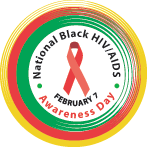National Black HIV/AIDS Awareness Day is around the Corner

Of all racial and ethnic groups in the U.S., blacks are the hardest hit by HIV and AIDS. According to the CDC's Dr. Kevin Fenton,
“The latest estimates indicate that while blacks make up just 12 percent of the U.S. population, they account for nearly half of new HIV infections...The harsh reality is that 1 in 16 black men will be diagnosed with HIV at some point in their lifetime, as will 1 in 30 black women.”
This issue is important to all of us. So we're interrupting our series on texting medication and appointment reminders to call your attention to National Black HIV/AIDS Awareness Day (NBHAAD)Exit Disclaimer which is observed on February 7.
The Strategic Leadership CouncilExit Disclaimer , which is comprised of nine key national organizations, plans and guides implementation of NBHAAD. Working in partnership with the CDC, the Council combines new and traditional media to promote awareness of, and access to, HIV/AIDS services for black Americans. Council member LaMont “Montee” Evans, CEO of Healthy Black CommunitiesExit Disclaimer , told us, ��“Utilizing new media––particularly social networking websites (e.g., FacebookExit Disclaimer and MySpaceExit Disclaimer ) has allowed us to market and raise awareness in the technological world. We can't rely solely on traditional venues to promote our activities and events. At some point, new and traditional media have to marry, and we believe we have established an excellent courting thus far.”
Here are some of the ways you can take action for NBHAAD:
- Visit www.blackaidsday.orgExit Disclaimer :
- Find local NBHAAD events to attend - or add your own!
- Download posters, fact sheets, and other materials.
- Watch public service announcements and webcasts.
- Learn more about how HIV and AIDS affects blacks in the U.S. with information from the Centers for Disease Control and Prevention:
- Watch or listen to an NBHAAD podcast from Dr. Kevin Fenton, Director of the National Center for HIV/AIDS, Viral Hepatitis, STD, and TB Prevention.
- Read the newest Morbidity and Mortality Weekly Report's NBHAAD Notice to Readers.
- Find more suggestions on how to take action for NBHAAD from the CDC.
- Promote HIV testing and know your status. Visit gettested.cdc.gov or send a text message with your ZIP code to “KNOWIT” (566948) to find your local HIV testing center.
- Share what you've learned!
- Add any of the above information - or other information - about NBHAAD to your blog, social networking profiles, or other websites.
- Talk about HIV with your friends, family, and colleagues.
We want to hear about how you take action for NBHAAD!
Please leave a comment and let us know how you plan to get involved in NBHAAD.
What's up next?
Next week, we'll return to our series on using text messages for HIV appointment and medication reminders.